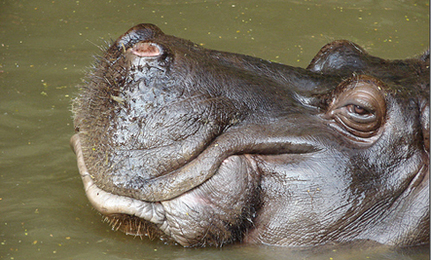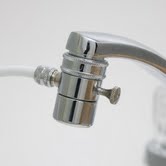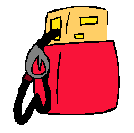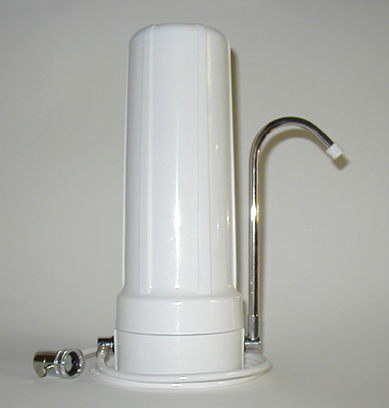 August 2010
August 2010
Go Here if you'd like to read this issue on our website.
An email extension of the Pure Water Gazette.
In this issue of the Occasional you'll hear about green water, tea-colored water, and even dry water. Pollution of water by coal ash, dairy antibiotics, toothpaste, shampoo, and anti-depressants. You'll meet the the Suburbanites, John Keats. Pure Water Annie, and even the Creator. Learn how hippos keep clean, what causes suicidal behavior in shrimp, and which end is up on a water filter cartridge. Hear how Model 77 got its name, who invented it, and how to change its cartridge. How many lawn mower accidents occur each year, the identity of ethyl tertiary-butyl ether, the number of birds killed each year by lawn care pesticides and, as always, much, much more. The Occasional is overseen and edited by Pure Water Gazette editor in chief Hardly Waite.
Water News from Around the World

While you were relaxing in the pool, a lot of important things happened in August. Follow the links to read all about it.
National Geographic made an intense video showing how hippopotami keep clean.
In spite of millions spent to improve its water system, a Kansas town still has tea-colored water.
A new trend, painting lawns green, saves work and water.
The presence of anti-depressants (Prozac) in sea water causes suicidal behavior in shrimp.
A study found that “Swimming pools contain a stew of chemicals that have the potential for causing genetic damage to mammalian cells and may place frequent swimmers at serious risk,” and concluded that the safest way to disinfect pools is with a combination of chlorine and ultraviolet.
At least 83 hippopotami died from anthrax in Uganda.
Cheese manufacturer Sorrento Lactalis Inc. has been assessed a $315,000 penalty for excess discharges into an Idaho river in violation of its wastewater permit levels.
Many Pennsylvania water customers complained of strange tastes and odors caused by algae growth in the Monongahela River due to warmer-than-average temperatures and the lack of precipitation.
In Brazil, indigenous tribes held 100 construction workers hostage in protest of a dam project.
India Today reported that at least 50 children in Punjab have become blind due to drinking polluted water.
In Denver, the South Platte River turned green because of excessive algae.
Scientists at Liverpool University have created a substance they call “dry water.”
In Cameroon 300 more people have died of cholera, a preventable water-borne disease that annually kills as many as 120,000 people.
The town of Onancock is apparently building its new wastewater treatment plant on top of an ancient burial ground.
Sacramento residents are facing a $10 per household increase in water charges to pay for removing ammonia from the waste discharge. Ammonia remaining in that wastewater, a byproduct of human urine and feces, is suspected of disrupting the food chain in the Sacramento-San Joaquin Delta.
A University of California study looked at the incidence of dairy antibiotics in ground water.
A new study shows that significant water pollution has occurred in 21 states as a result of coal ash being dumped by utilities companies.
Triclocarban and triclosan are getting into our water supplies via shampoos, soaps, and toothpaste.
Model 77, "the world's greatest $77 water filter," celebrates its 21st birthday.
Classic Model 77. Its most popular vessel style: We call it "The King."
Simplify, simplify.--Henry David Thoreau.
If you visit Pure Water Products' Denton store (the only one we have) you'll see a picture of our founder, Pure Water Annie, with a caption that credits her with, among other things, having "invented the Model 77 water filter just a few days after God created water." Skeptics may point to a chronological discrepancy between Model 77's invention and its 21st birthday, but this is really no more incredible than the gap between the dates of the Bang and the Creation. So we decided to leave that for you to worry about. The world is filled with discrepancies.
What is certain is that in 1989 we started calling our nifty and soon-to-become-niftier countertop water filter Model 77 for the simple reason that its price was $77. Now, 21 years later, the product is much improved , its price is still $77, and we now pay shipping. So the price of the shipped unit has actually gone down a few dollars since 1989.
In our early advertising we compared Model 77's simplicity and clean utility to that of the canoe and the ten-speed bicycle, and we got endorsements from the likes of John Keats and Groucho Marx. But mainly what we did was try to make Model 77 as simple and basic and trouble-free as it was effective and to assure that it would keep working forever by giving it a genuine lifetime guarantee.
A countertop water filter is a joy forever. -- John Keats.
The lifetime guarantee is for real, and we've never failed to honor it. It covers every bit of the unit except the filter cartridge, which is a replaceable item. If any part fails, call or email and we send a replacement. No shipping charge. No delays. No forms to fill out. We ask for a return of the faulty part only when someone requests so many parts that we suspect he may be building water filters to go into business for himself.
No doubt there are at least 77 reasons why Model 77 is the world's greatest $77 water filter, but I'll spare you the whole list. Here are a few:
-
There are two model sizes to choose from and the more popular size has 3 different housing styles. The most popular of all is the full-sized version we call "The King." It's the one in the picture above. (Other housing styles and more details.)
-
The King and the two other models in the same size use the most common filter cartridge size made: 9.75" X 2.5". There is much to be said for being common. It assures almost limitless cartridge variety and easy access to replacements. Almost everyone who makes a water filter makes cartridges in the 9.75" X 2.5" size. Our own cartridge menu lists 35 cartridges that will fit the standard Model 77, without counting sediment cartridges. Choose from among carbon blocks, coconut or coal based carbons, ceramics, KDF. and various media cartridges that remove lead, bacteria, cysts, volatile organics, chloramines, chlorine, hardness, dissolved solids, arsenic, nitrates, et al.
-
The "candle size" Model 77 accepts Doulton candles plus a few select carbon blocks that we carry. How's this for a bargain
 ? The regular Doulton HCP countertop unit, with a Doulton Ultracarb candle, costs $179. Our Model 77 slimline equipped with exactly the same Doulton Ultracarb candle costs $77, shipping included, and comes with a lifetime guarantee. I won't mention that it's a better, more durable water filter. With Model 77 you get to pocket $102 and your unit isn't covered with gaudy decals. If you want a picture on it, add your own.
? The regular Doulton HCP countertop unit, with a Doulton Ultracarb candle, costs $179. Our Model 77 slimline equipped with exactly the same Doulton Ultracarb candle costs $77, shipping included, and comes with a lifetime guarantee. I won't mention that it's a better, more durable water filter. With Model 77 you get to pocket $102 and your unit isn't covered with gaudy decals. If you want a picture on it, add your own. -
In addition to any cartridge we have in our cartridge menu and a choice of four vessel styles, you get your choice of two stainless steel spout styles. The Model 77 in the picture has the classic "gooseneck." You can substitute the "long reach" if you prefer. (Pictures and details.)
-
The whole unit is made for easy parts replacement. Most makers use clamp-on diverter valves, for example, which means that if you want to replace the diverter you have to replace the entire hose assembly plus the elbow that attaches the hose to the housing. With Model 77, you just screw the old valve off and screw the new one on in its place. The picture shows the classy QMP-made compression diverter valve that we use. It replaces easily without tools.
- Model 77 is available as a double filter as well. Double units give twice the filtration capacity and allow for diversity. Fluoride, for example, is difficult to remove with a single filter because the fluoride-reduction medium needs an entire cartridge to work well. A fluoride cartridge followed by a carbon block cartridge makes a great combination. Chloramine reduction also works best with double filters. Our double countertops have the same lifetime guarantee as the standard Model 77.
- Model 77 is extremely versatile. It converts easily to a siphon filter for emergency use when no running water is available. (The conversion kit is free for the asking at time of purchase.) We also have an inexpensive undersink conversion kit if you decide later that you'd like to turn the unit into an undersink filter with a faucet on the countertop. (Conversion is recommended for the King version only.) Model 77 is easy to take along when you travel and it can be easily moved to another room if you decide you want an undersink unit in the kitchen. It can go to college with your daughter. It's a great gift. It's very easy to service, as Pure Water Annie will explain below.
Outside of a dog, a countertop water filter is man's best friend. Inside of a dog, it's way too dark to worry about water.-- Groucho Marx.
Winterize Your Lawn
Introductory Note. “Winterize your Lawn” takes a whimsical look at a very serious flaw in the American lifestyle. The grassy, well-kept lawn, which we have come to think of as an inevitable and never-ending icon of our culture, will eventually have to go. As sure as the sun sets in the west, we will eventually be forced by the necessity in the form of water shortages and environmental pollution to find a better use for our time and limited resources than the meaningless ritual of grass growing. Our stubborn adherence to the culture of the lawn will surely make us the laughing stock of future civilizations—the society that worked its fingers to the bone watering and nurturing a useless crop that we then harvested with noisy, smelly little toys, and sent to the landfill in neat plastic bags.
As silly as it seems, lawn care has become such an entrenched ritual in America that to criticize the custom is like failing to support the troops or refusing to kowtow before the flag.
“Winterize your lawn,” by an unknown author (or one too wise to reveal his name), is encouraging to me because it reminds me, a lawn atheist, that the Almighty is really on my side. – Gene Franks.
Winterize your lawn," the big sign outside the garden store commanded. I've fed it, watered it, mowed it, raked it and watched a lot of it die anyway. Now I'm supposed to winterize it? I hope it's too late. Grass lawns have to be the stupidest thing we've come up with outside of thong swimsuits! We constantly battle dandelions, Queen Anne's lace, thistle, violets, chicory and clover that thrive naturally, so we can grow grass that must be nursed through an annual four-step chemical dependency.
Imagine the conversation The Creator might have with St. Francis about this:
"Frank, you know all about gardens and nature. What in the world is going on down there in the Midwest? What happened to the dandelions, violets, thistle and stuff I started eons ago? I had a perfect, no-maintenance garden plan. Those plants grow in any type of soil, withstand drought and multiply with abandon. The nectar from the long-lasting blossoms attracted butterflies, honey bees and flocks of songbirds. I expected to see a vast garden of colors by now. But all I see are these green rectangles."
"It's the tribes that settled there, Lord. The Suburbanites. They started calling your flowers 'weeds' and went to great extent to kill them and replace them with grass."
"Grass? But it's so boring. It's not colorful. It doesn't attract butterflies, birds and bees, only grubs and sod worms. It's temperamental with temperatures. Do these Suburbanites really want all that grass growing there?"
"Apparently so, Lord. They go to great pains to grow it and keep it green. They begin each spring by fertilizing grass and poisoning any other plant that crops up in the lawn."
"The spring rains and cool weather probably make grass grow really fast. That must make the Suburbanites happy."
"Apparently not, Lord. As soon as it grows a little, they cut it--sometimes twice a week."
"They cut it? Do they then bale it like hay?"
"Not exactly, Lord. Most of them rake it up and put it in bags."
"They bag it? Why? Is it a cash crop? Do they sell it?"
"No, sir. Just the opposite. They pay to throw it away."
"Now let me get this straight. They fertilize grass so it will grow. And when it does grow, they cut it off and pay to throw it away?"
"Yes, sir."
"These Suburbanites must be relieved in the summer when we cut back on the rain and turn up the heat. That surely slows the growth and saves them a lot of work."
"You aren't going believe this, Lord. When the grass stops growing so fast, they drag out hoses and pay more money to water it so they can continue to mow it and pay to get rid of it."
"What nonsense! At least they kept some of the trees. That was a sheer stroke of genius, if I do say so myself. The trees grow leaves in the spring to provide beauty and shade in the summer. In the autumn they fall to the ground and form a natural blanket to keep moisture in the soil and protect the trees and bushes. Plus, as they rot, the leaves form compost to enhance the soil. It's a natural circle of life."
"You better sit down, Lord. The Suburbanites have drawn a new circle. As soon as the leaves fall, they rake them into great piles and have them hauled away."
"No! What do they do to protect the shrub and tree roots in the winter and keep the soil moist and loose?"
"After throwing away your leaves, they go out and buy something they call mulch. They haul it home and spread it around in place of the leaves."
"And where do they get this mulch?"
"They cut down trees and grind them up."
"Enough! I don't want to think about this anymore. Saint Catherine, you're in charge of the arts. What movie have you scheduled for us tonight?"
"Dumb and Dumber, Lord. It's a real stupid movie about..."
"Never mind. I think I just heard the whole story."
 Featured Water Issue : MTBE (Methyl tertiary-butyl ether)
Featured Water Issue : MTBE (Methyl tertiary-butyl ether)
The gasoline additive MTBE has been used since 1979 as a gasoline oxygenate to help gasoline burn cleaner. It was in wide use as a substitute for lead in the 1990s until the realization that it was contaminating groundwater in many areas of the US led to its use being banned or severely restricted. It has now been replaced largely by ethanol.
MTBE is a persistent pollutant that can remain in groundwater for many years. The EPA's recommended limit is 20 to 40 parts per billion, but some states have set lower limits. MTBE is not classified as a human carcinogen at low exposure levels, but exposure to large doses of MTBE carries significant non-cancer-related health risks. The effects of the prolonged presence of this alcohol derivative are not fully understood.
MTBE gained national attention largely because it has a distinctive odor and can be easily detected by consumers.
Treatment: MTBE is best removed from water by Activated Carbon, and coconut shell carbon is the preferred carbon. In most cases coconut shell carbon has a 2.5 times higher capacity for MTBE removal the bituminous carbon. Even so, sufficient contact time is essential for effective removal. A 12 x 30 or 12 X 40 mesh size is normally used, and this supports a flow rate of about 1 gpm per cubic foot of granular carbon. Higher rates are possible with 20 X 50 mesh coconut shell, but pressure drop increases dramatically. For drinking water, many carbon block filters in standard drinking water size effectively reduce MTBE at a flow rate of 0.5 to 0.9 gallons per minute,
Lesson to be learned. A mini-editorial: Lead was used as a gasoline additive for decades until it was determined to be a major hazard to human health. Lead was replaced by MTBE, which was soon removed as a threat to human health. MTBE has now been replaced by ethanol, and evidence is mounting that ethanol isn't a great idea either. The eventual conclusion we're heading toward is that burning gasoline in automobiles wasn't such a good idea after all.
The Water Treatment Issues section of the Occasional's website continues to grow. If you have questions about a specific water issue, it's the place to look first.
Pure Water Annie's Service Tips Series
Taking Care of your Model 77 Water Filter
Model 77 isn't some luxury guest in your home that you have to coddle. It's tough and tireless, but about once a year you should put a new filter cartridge in it. To do this, first buy the cartridge (Pure Water Products will send you a postcard reminder which will tell you which cartridge you need).
When you have the cartridge, open the Model 77 up by taking the top part (technically called the sump) off of the bottom part (technically called the base). It's a good idea to flip it upside down before you do this so you won't spill water. There's a wrench that came with it (which you probably have lost by now) but you usually don't need it. If it's hard to get apart, get someone with two hands to help. It just screws apart. Nothing fancy about it. Counterclockwise.
When it's open, take out the cartridge. (On the slimline model, the cartridge screws out of the base. On the standard models, the cartridge will fall right out.)
It's a good idea, but not essential, to lubricate the O Ring that sits in a lip on the sump with silicone grease.
Slip the new cartridge into place. On the slimline model, it's obvious which end goes in first. If you cant figure it out, God bless you. On the standard model, if your new cartridge has rubber gaskets at both ends, it doesn't matter which way it goes in. If it has only one gasket, the gasket goes toward the base. (If you get the one-gasket model in backward you'll know right away because no water will go through the filter when you start it up.)
When the cartridge is in, set it back on its base and turn on the water. It's normal for a bunch of black stuff called carbon dust (technically called fines) to blow out of the spout when some cartridges are brand new. Whether you have fines or not, let it run five or ten minutes to rinse the cartridge well before you drink the water.
It's totally normal at this point for the water to be cloudy with air. Run some in a glass. If the water clears from the bottom upward, it's air. If it clears from the top down, it's most likely a deadly African BooLoo virus and it's probably too late for you to be saved. Just joking.
New on the Occasional's Website: Pure Water Annie's Glossary of Water Treatment Terms. Everything from Absolute to Zebra.

Pure Water Gazette numerical wizard B. Bea Sharper on “Lawn Care.”
Amount that Americans spend annually on lawn equipment: $40, 000, 000, 000.
Estimated number of birds killed each year in the U.S. by lawn-care pesticides: 7,000,000.
Approximate number of Americans injured each year in using lawn mowers: 7,600 (roughly the same as by firearms).
Gallons of water used every day by a single golf course in Tampa, Florida: 178,800 .
Go here for More B.B. Sharper.

